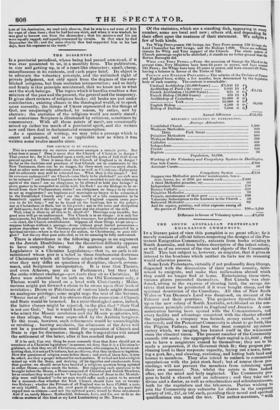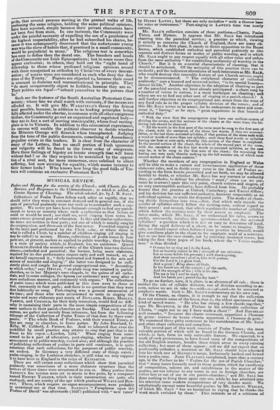THE SOUTH AUSTRALIAN PROTESTANT EMIGRATION COMMUNITY.
IN a literary point of view this pamphlet is no great affair; for it merely consists of official letters respecting the designs of the Pro- testant Emigration Community, extracts from books relating to South Australia. and from letters descriptive of the infant colony, as well as of an account of the rise and objects of the Community
itself. This last subject is, however, so singular, that it gives an interest to the brochure which neither its facts nor its reasoning would otherwise possess.
Some Irish Protestants, virtually if not professedly deep Orange, disgusted with the dissensions of their mother country, deter- mined to emigrate, and make that millennium abroad which they could no longer find at home. Entertaining these views, various places presented themselves. But Canada was aban- doned, owing to the expense of clearing land, the savage dis- tricts that must be penetrated if it were bought cheap, and the spiritual destitution of the Canadians. All idea of New South \Vales or Van Dieinen's Land was dismissed, on account of the Felonry and their practices. The projectors therefore decided upon the new colony of South Australia, established on the non- dispersion principle advocated in England and America. A com- munication having been opened with the Commissioners, and every facility and advantage consistent with the charter afforded the applicants, a company was formed, money raised, a vessel chartered; and the Protestant Community is about to go forth, like the Pilgrim Fathers, and form the most complete miniature society which, we imagine, has located itself in the wilderness since the classical times. The present number of the Community exceeds 500 souls ; the aggregate of their capital is 55,0001.; they
are to have a magistrate named by themselves; they are to be made a corporation, if the Governor think fit; they propose pur- chasing land in their corporate capacity, laying out a town, form- ing a port, &c., and clearing, enclosing, and letting both land and houses to members. They also intend to embark in commercial speculations with the joint stock fund; but of course these pro- ceedings will not prevent the members from colonizing upon their own account. Nor, whilst the estate is thus looked after, are the mind and body neglected. The Community pro-
pose to build a church and an infirmary ; and they take out a divine and a doctor, as well as schoolmasters and schoolmistresses, both for the capitalists and the labourers. Parties wishing to join the Community may subscribe for shares in the corporate society of 501., 251., or 10/. each, providing their moral and spiritual qualifications can stand the test. The author mentions, "with pride, that several persons moving in the genteel walks of life, 11r,treasing the same religion, holding the same political opinions, have been rejected, simply because instance, private characters have not been free from stain. In one nstance, the Community were under the painful necessity of expelling the son of a gentleman of the highest respectability, after be had subscribed his shares, be- muse it was subsequently discovered that the unfortunate young i man was the slave of habits that, if practised in a small community, would be prejudicial to many. The religious test is somewhat less easy to define than the moral one. The founders and heads of theCommunity are Irish Episcopalians; but in some cases they appear exclusives; in others, they hold out the "right hand of fellowship to those whose professed religious opinions accord with those recognized as orthodox by Christians of every denomi- nation; of course none are considered as such who deny the doc- trine of the Trinity: Papists are objected to, because their creed is unsound in doctrine and unconstitutional in principle. They "do most unequivocally object to Infidels, because they are so." Their politics are loyal—"submit yourselves to tho powers that
be."
Such are the features of the South Australian Protestant Com- munity; whose fate we shall watch with curiosity, if the means are afforded us. It will give Mr. WAKEFIELD.S theory the fairest
trial possible, because, in addition to its leading principles being fully effected under the charter, in common with all other emigrants
thither, the Community go out an organized and regulated body— they are in fact a sort of moving municipality, whose final resting- place is to he Victoria. In addition to this economical experiment, its success will enable the political observer to decide whether the Milesian Orange will flourish when transplanted. Judging from the tone of the public documents, something of Ascendancy prejudice exists in the leaders. It is clear from the character of many of the Letters, that no small portion of Irish ignorance and vulgarity will be found in the lower order of emigrants. Rave these feelings of bigotry an innate strength that will burn without fuel ? or do they require to be nourished by the opposi- tion of a rival sect, far more numerous, once subdued to silent suffering, but now striving for equality, which seems tyranny to their former lords ? Who knows how long the good folds of Vic- toria will continue an exclusive Protestant fleck ?



























 Previous page
Previous page